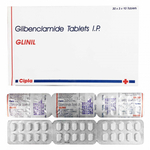Glycomin 5mg Tablet
Glycomin 5mg Tablet contains Glibenclamide, also recognized as glyburide, and serves as an oral antidiabetic medication crucial for managing type 2 diabetes.
Glycomin 5mg Tablet acts as an oral hypoglycemic (glucose-lowering) agent, playing a pivotal role in regulating blood sugar levels for individuals with type 2 diabetes. Its mechanism involves stimulating insulin release, contributing to improved glycemic control when complemented with lifestyle adjustments.
Administer Glibenclamide orally once a day, usually after breakfast or the initial meal of the day. The initial dosage is typically a low 25 mg per day, with adjustments made based on blood glucose levels. Regular monitoring of blood sugar levels is imperative during treatment.
While generally well tolerated, common side effects may include nausea, heartburn, and a potential drop in blood sugar levels. In more serious cases, adverse effects such as angioedema and low blood sugar may manifest.
Glycomin 5mg Tablet should not be used in cases of allergic reactions to the drug, diabetic ketoacidosis, type 1 diabetes, glucose phosphate dehydrogenase deficiency, or severe liver or kidney disease. Caution is advised during pregnancy and breastfeeding. Regular blood sugar monitoring, especially during stress or medical procedures, is recommended.
In the event of a missed dose, take it as soon as remembered, unless it's close to the next scheduled dose. Avoid doubling up on doses and seek guidance from healthcare providers for personalized advice.
Similar Medicines
Related Posts

1:15
5 Healthier Sugar Alternatives!

1:15
Pregnancy and Diabetes: What to Eat? | Foods to Eat for Gestational Diabetes!

1:15
Are Your Hormones Out Of Balance? Signs & Symptoms!

1:15
Why Is There Blood in Your Poop? Causes, Symptoms, and When to See a Doctor!

1:15
How Do You Know If You Have a Vaginal Infection? Warning Signs!

1:15
Top Health Benefits of Cinnamon | How to Use It for Better Health!

1:15
Is Your Blood Pressure Too Low? What Are the Best Remedies to Fix Low Blood Pressure Instantly?
Disclaimer : This information is not a substitute for medical advice. Consult your healthcare provider before making any changes to your treatment . Do not ignore or delay professional medical advice based on anything you have seen or read on Medwiki.
Glycomin 5mg Tablet
Prescription Required
Packaging :
strip of 10 tablets
Manufacturer :
Exotic Laboratories Pvt LtdComposition :
Glibenclamide (5mg)





















.svg)
